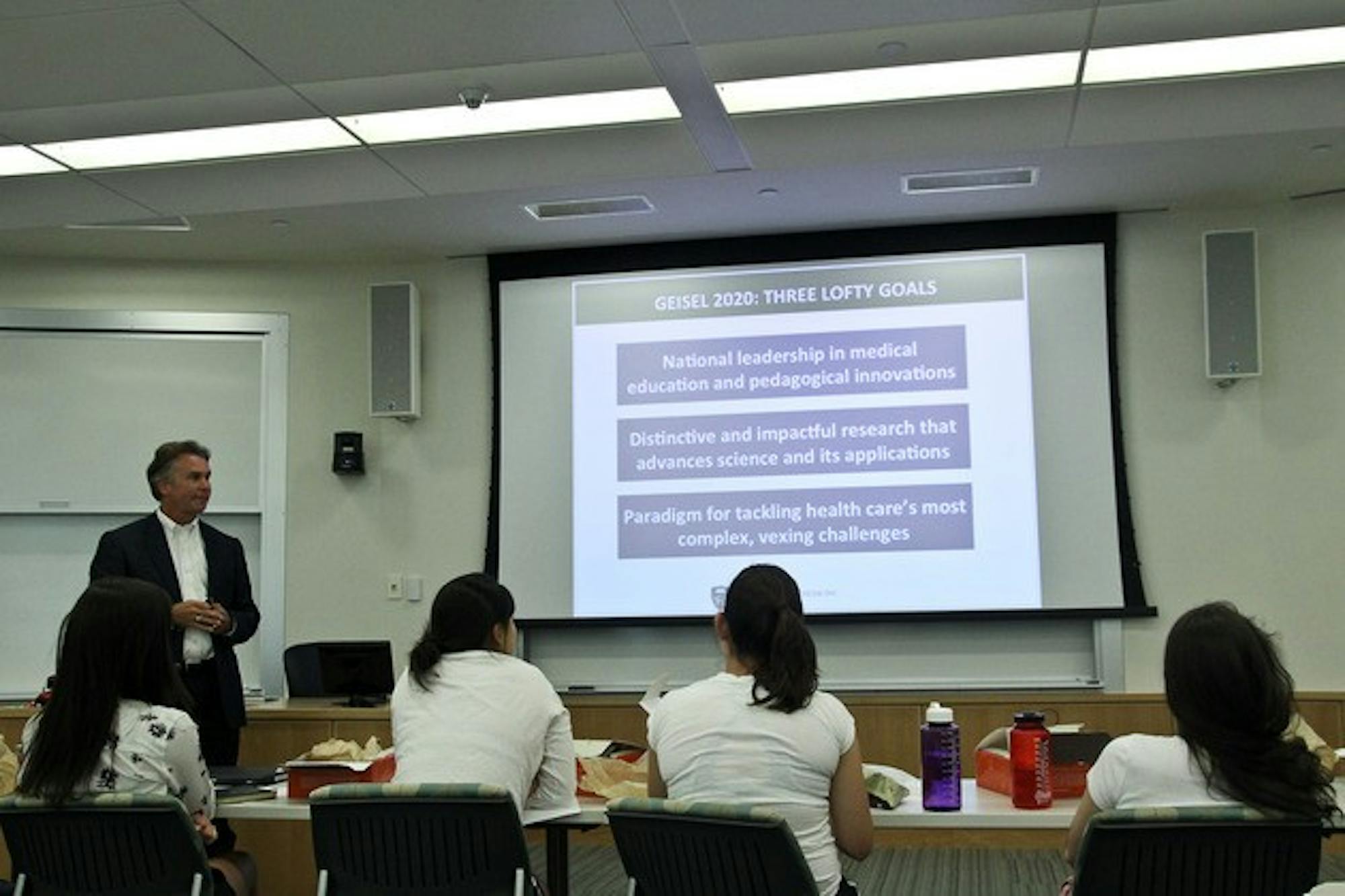The program, which will be implemented for the first time in the 2012-2013 academic year for the Class of 2014, requires undergraduate students to submit their applications by October, with interviews and application review occurring throughout November and December, according to Geisel Director of Admissions Andy Welch. Selected applicants will receive notification of their admission in January 2013, Welch said.
"Our goals with this program are to try and enhance connections and ties between the College and the medical school, as well as enrich the Geisel student body and hopefully provide a streamlined process for the undergraduates who decide to apply," Welch said. "It's also an opportunity for Dartmouth students in their senior year to participate fully in senior activities without having to deal with the distractions of the full-on medical school application process."
Geisel also hopes to be able to build ties with admitted students while they complete their senior year at the College, with opportunities for "enrichment activities" and interaction with the medical school community before they arrive at Geisel, Welch said.
The application process will involve multiple letters of recommendation, transcripts and an application fee of $130, Welch said. Applicants will not be required to take the Medical College Admissions Test, but will instead submit the same SAT scores they used when applying to the College, according to Welch.
"There is no specific formula for admission, and unique applicants will be reviewed in a holistic way to piece together the best picture of an applicant we can," he said. "But most importantly, we're looking for people who are going to be good doctors. Medicine today is multiple professions, different platforms and aspirations, and that's part of the exciting diversity of the Geisel student body. Already, Geisel includes people who are headed towards National Institute of Health-sponsored research, people focused on policy and public health, specialists, sub-specialists and general practitioners."
Welch emphasized that students from a "variety of backgrounds" would be considered for admission, as well as those with "broad academic talent, an interest in lifelong learning, academic and intellectual curiosity and a well-explored interest in health care and science."
He encouraged those at the information session to begin thinking about the process this summer, by finding those they want to write letters of recommendation and preparing for the personal essays that will accompany the application.
The program should be especially attractive to students as Geisel begins to undergo major changes to its curriculum and student resources, according to Richard Simons, senior associate dean for medical education.
"Dartmouth is one of the few medical schools in the country that can train physicians not only to be clinicians but to help solve some of the major problems in our country when it comes to health care delivery," Simons said. "We want to be a leader in medical education for the next generation of physicians. We're in the midst of a curriculum reform launching in 2015, with 100 faculty members currently working on the redesign to incorporate state-of-the-art, innovative technology into the curriculum."
Geisel hopes to continue strengthening its connection with the Dartmouth Center for Health Care Delivery Science to put the medical school at the forefront of research for some of the country's "most vexing problems," Simons said.
In the future, curriculum reform will enable students to graduate with both a medical degree and a master's degree in four or five years, and research funding will increase from $137 to $180 million, with between 75 and 100 researchers added to the staff, according to Simons. The medical school will improve connections with Dartmouth-Hitchcock Medical Center to provide "partnerships for research and education" and "optimize operational accountability through careful fiscal performance," he said.
The reforms will also impact students' day-to-day experience at Geisel, with more technology present in the classroom and a greater emphasis on small group work, Simons said. The first step of the upgrade comes in the form of iPads that Geisel will give to all first-year medical students for academic purposes at the start of the upcoming year, according to Simons. Geisel administrators hope to solve the "lack of integration" that students experience with their "clerkships" in different specialties in the third year of medical school, he said.
"Students will work in internal medicine, surgery, pediatrics, neurology, family medicine, psychology and obstetrics and gynecology," Simons said. "The problem is that they often have ad-hoc patient and teacher assignments, so we want to make sure students have longitudinal experiences and spend more time with a group of patients and a specific teacher."
Simons cited Geisel's small student body compared to most other medical schools as one of its top attractions.
"At 85 students, it's not so big that you lose your individuality," he said. "Once you get over 100 and start increasing students, you start to lose some of that personal touch."
Administrators are currently working on a program that will allow students to defer admission for a year between graduating from Dartmouth and entering Geisel, according to Welch.
"Normally you would enter medical school in August, but we want to give Dartmouth students the opportunity to create an activity for a year, perhaps working with the medical school here in Hanover, somewhere in New England or doing something elsewhere," he said. "We discussed the possibility of being in Hanover, from the time you start as an undergraduate to the time to you leave Geisel, for eight years, and that was attractive to some. But it was wildly intimidating for others, so we are providing a way to break that up."
For students still on the fence about applying to medical school, the lecture was a valuable resource, according to Annie Pasternak '14.
"I've recently been thinking about whether I want to go pre-med or not, and I'm trying to get as much information as possible," Pasternak said. "This was a good introduction to how Dartmouth is giving opportunities to undergraduates to get into the medical school."




